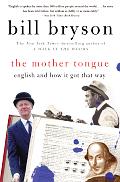 Writer Working devotees (not many) may wonder if they’re seeing double, since we had a great session with Bryson just a couple of posts ago. Got me so worked up I couldn’t wait to get back to him. The Mother Tongue is another winner. It’s over 20 years old, so many of the stats and expressions are no longer current, but the heart of the story remains true. Like At Home it’s so full of facts you wonder how he found them and organized them, let alone turned them into a readable story. But wonder of wonders, he did. Did he ever. One revelation after another, and none of them disconnected from the whole.
Writer Working devotees (not many) may wonder if they’re seeing double, since we had a great session with Bryson just a couple of posts ago. Got me so worked up I couldn’t wait to get back to him. The Mother Tongue is another winner. It’s over 20 years old, so many of the stats and expressions are no longer current, but the heart of the story remains true. Like At Home it’s so full of facts you wonder how he found them and organized them, let alone turned them into a readable story. But wonder of wonders, he did. Did he ever. One revelation after another, and none of them disconnected from the whole.
In the beginning there were the Angles and the Saxons (Of course the Romans came before that, but they left the party early and spent most of their linguistic capital elsewhere.), then the Angles disappeared, but they still get credit, as the whole of England is labeled Anglo-Saxon, even though the Saxons’ Germanic dialect weilded the strongest influence on what’s called Old English. Oh, except for the Scandinavian incursion via the Vikings. They dropped a pretty penny in the collection plate. All this between about 400-1000 A.D. (Or if you want to get secular about it, C.E.) Then came the Normans, with their Frenchified ways. French was the court language, English the commoners’ language. The royals didn’t learn English, and the commoners didn’t expect them too. But we still get some of the leftover French snobbery when “shit” is a cussword while “manure” is proper. The same with piss/urine. And so on like that.
The tribes melded and moved, and the language becomes more commonly spoken till in the 14th Century we find Chaucer and his cohort using a language we call “Middle English,” perfectly recognizable as English–unlike Old English, which looks as foreign as Cyrillic. Then our language changed quickly–in a couple of generations–to forms and vocabulary to an even more modern format, and in a couple of hundred years, we have Shakespeare writing in an English that is still heard and understood and reverenced in the classroom and beyond to multiple Shakespeare festivals across the country. Chaucer’s people pronounced the e on the end of words, for example. A hundred years later, it was silent, and scholars were unaware it had ever been thus. And so on like that.

So that’s the history, and Bryson provides examples aplenty of place names and vocabulary to illustrate his research. Amid all the facts, though, is this core sentence that he thinks sets English apart from other languages–such as the French and Spanish, who have always sought to maintain purity–It is true that English was immeasurably enriched by the successive linguistic waves that washed over the British Isles. But it is probably closer to the truth to say that the language we speak today is rich and expressive not so much because new words were imposed on it as because they were welcomed.
Once the history lesson is over, we go on to other matters, such as spelling, names, and dialects. There’s a whole chapter on swearing. Lots of entertaining passages on differences between British and American English. English people bathe wounds but not their babies; they bath their babies. Whereas an American wishing to get clean would bathe in a bathtub, and English person would bath in a bath.English people do bathe, but what they mean … is to go for a swim in the sea. Unless it’s too cold . . . in which case they stand in water up to their knees. This is called having a paddle.
It continues and will continue. I don’t feel I’ve given a good feel for the playfulness of this work. Perhaps closing with this anecdote about how language changes will do so:
Jules Feiffer once drew a strip cartoon in which the down-at-heel character obsered that first he was called poor, then needy, then deprived, then underprivileged, and then disadvantaged, and concluded that although he still didn’t have a dime he sure had acquired a fine vocabulary.
And Bryson will help yours as well.
